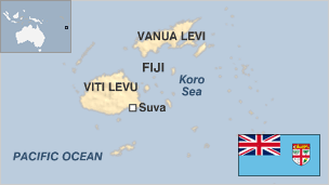
Facts and stats about Fiji
The Republic of the Fiji Islands is made up of 800 volcanic and coral islands. The country became autonomous in 1970 after being a colony of Great Britain for almost 100 years. Since then, it has embraced a constitutional and democratic form of government based on the so-called Westminster model. However, the democratic reign was cut short by two military coups in 1987. Lieutenant Colonel Sitiveni Rabuka revoked the 1970 Constitution and declared the country a republic. There was a brief rule by the military government. Two succeeding interim administrations followed and a new constitution was promulgated on July of 1990. Elections were held in May 1992. Another Constitution was adopted in 1997 following numerous consultations.
Fiji reeled from another internal setback in May of 2000 when a group of armed men led by George Speight took control of Parliament and held hostage former Prime Minister Mahendra Chaudhry and members of his government for 56 days. The 1997 Constitution was repealed and the President resigned. There were three consecutive unelected interim administrations that controlled power. In 2001, the Fiji Courts declared that the 1997 Constitution was still legitimate. General elections were held in the same year and the nation returned to a parliamentary democracy under Prime Minister Laisenia Qarase. He was also unseated in a coup in 2006 led by Commodore Voreqe Bainimarama. According to the provisional government, elections will be held this September.
Economic grew by 2.5 percent in 2013 due to strong consumption. However, Fiji's economy has been stagnant with an annual growth rate of only 0.7 per cent as against a 2.5% growth in the years before the coup. Sugar is Fiji's largest export industry. However, it experienced considerable damage to infrastructure and production wavered because of recent natural disasters. The Republic of Fiji has strong commercial relationship with Australia. More than 50,000 Fijians live and work in Australia while 300,000 Australians visit Fiji annually. Australia is Fiji's principal trading and commercial partner in the region. It is also the largest foreign investor in Fiji with a two-way trade amounting to AUD1.8 billion every year. In 2011, Australia was Fiji's biggest export destination and second largest origin of imports.
- Agriculture 104
- Background 11
- Cost of living 53
- Crime 40
- Culture 16
- Disasters 2
- Economy 2644
- Education 549
- Energy 409
- Environment 169
- Geography 83
- Government 155
- Health 258
- Import 3
896,758
Population. Ranked 161st in 2013.
$4,437.76
GDP per capita. Ranked 95th in 2012.

18,270 sq km
Sq. km. Ranked 147th in 2008.